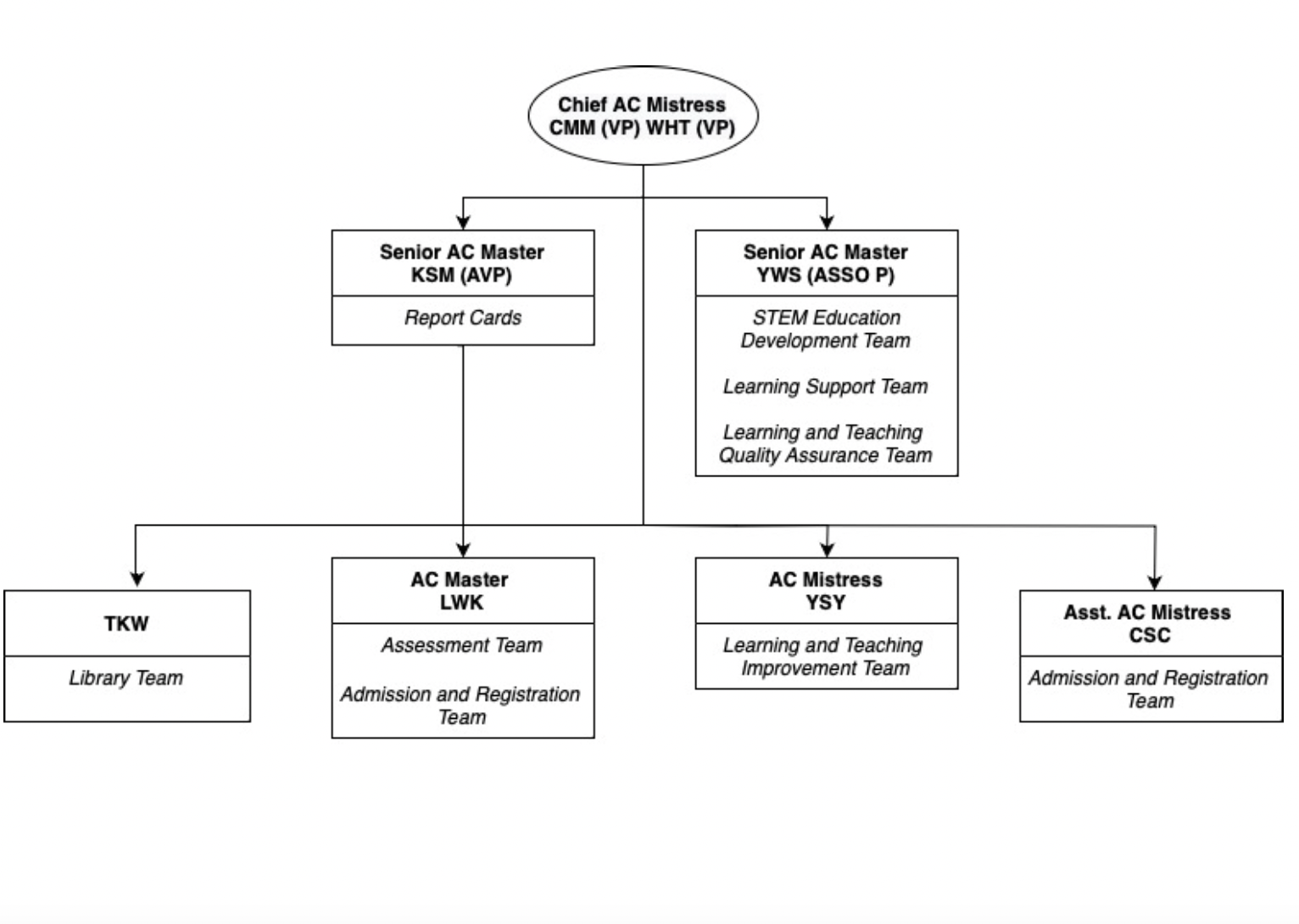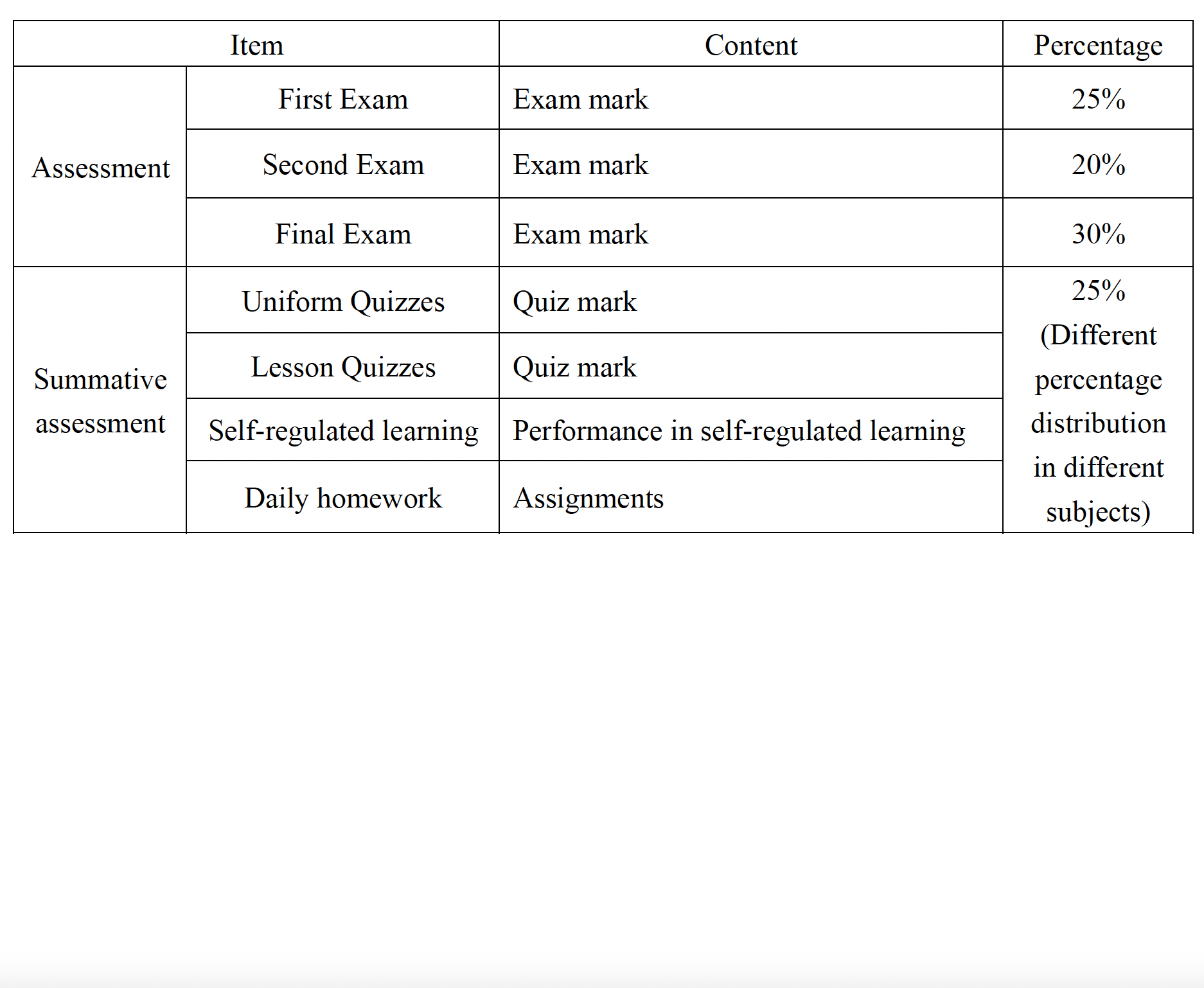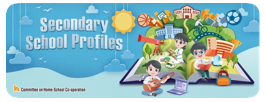Academic Committee
Aims
- To build up serious learning and teaching culture and atmosphere, and enhance students’ interests and capabilities in learning.
- To co-ordinate the development of subjects and library reading programs to promote reading in school.
- To develop school-based curriculum and effective learning and teaching strategies.
- To promote different teaching methods and strategies to enhance the teaching effectiveness.
- To develop systematic operational procedures.
- To construct and develop the curriculum in accordance with the requirements of the Education Bureau.
- To carry out national security education through curriculum and related activities, strengthen students' understanding of the rule of law and national conditions, understand the importance of safeguarding national security, and enhance the sense of national identity.
Members and Structure (2024-25)
|
Chief AC Mistress |
: Vice Principal Ms. Wong HT |
|
|
Vice Principal Ms. Chiu MM |
|
Senior AC Master |
: Assistant Vice Principal Mr. Kwan SM |
|
|
Associate Principal (STEM) Mr. Yeung WS |
|
AC Master/ Mistress |
: Mr. Lam Wai Kin, Ms. Yip SY |
|
Assistant AC Mistress |
: Ms. Cheng SC |
|
Members |
: Mr. Chan D, Ms. Law HY, Ms. Tin KW |
|
Assistant |
: Ms. Wong HL |
|
General Office |
: Ms. Chan NY |
|
S1 AC Mistress |
: Ms. Cheng SC |
|
S2 AC Mistress |
: Ms. Yip SY |
|
S3 AC Master |
: Mr. Lam WK |

Faculties and Dean
|
Faculties |
Dean |
|
English |
LWK |
|
Chinese Language & Culture and History |
WHT |
|
STEM |
YWS, KSM |
|
Humanities |
YSY |
|
Creative & Performing Arts |
CSC |
|
Sports Science |
KSM |
Non-Chinese speaking (NCS) Students
Chinese Language and Putonghua: The school is currently designing and developing a school-based Chinese language curriculum for NCS students. NCS students are not required to take Putonghua lessons. Instead, they will be provided Chinese language consolidation training.
Social & Cultural Studies (SCS): Split-class arrangement is in place for NCS students, where English is the medium of instruction for the class. The subject requirements, including syllabus, assignments and assessments is the same as local students, despite being conducted in English.
Chinese History: Split-class arrangement is in place for NCS students. Small group teaching for NCS students also makes it easier to teach them the historical timeline through storytelling.
For examinations, a different set of paper will be provided for NCS students in Chinese Language and Chinese History. For Social & Cultural Studies, the papers would be set in English, with the same content as local students.
Project-based Learning
To develop an independent learning habits among our students and equip them with the skills of lifelong learning, Secondary 2 and 3 students are required to complete cross-curricular project-based learning.
To allow students to share the fruits of their efforts with their peers, a presentation day is arranged for students to present the findings of their studies.
MAKER Curriculum
The “MAKER” Curriculum is our school-based curriculum, which aims to extend students learning in STEM and their generic skills through cross-curricular collaboration. MAKER is an acronym of the five skills that we want students to acquire through this curriculum, namely Mathematical Modelling skills, Analytical skills, Knowledge Management skills, Entrepreneurship and Research skills. The teaching of these skills is infused in different subjects and the MAKER courses, where students can learn the skills in authentic contexts.
IT in Education
Bring-Your-Own-Device (BYOD) and hardware in campus
The BYOD policy implemented from School Year 2020/21 brough our IT in education to the next level. To support the BYOD policy, a wide variety of hardware are installed in all classrooms and in the campus, including LED projectors, visualizers and iPads. Wi-fi connection is also available in the whole campus to facilitate learning both inside and outside the classroom. Students can also use the computers in the computer rooms and library for learning after school.
Learning and Teaching
The Apple Books and Keynotes created by teachers were adopted in lessons to stimulate students' learning interests and self- learning ability. All subjects in our school have made use of online learning platforms to assist learning and teaching. Google Classroom is the main platform used for management of learning. Other school-based interactive learning apps and online resources are also frequently used to help students learn in a more engaging way. There is an AI app for past paper practice and an AR app for homework assistance. This helped to cultivate students' self-learning habits, enhance their self-learning ability, and increase teaching effectiveness. Together with the support on Moxo (x.TNKJSC), our internal communication platform, students can be well supported for learning online.
Promotion & Graduation Requirements
1. Students should pass all three subjects of English, Chinese and Mathematics.
2. The average mark of all subjects should reach 50 marks or above.
4. The conduct grade should be Grade B or above.
5. Students should have not less than 95% attendance rate.
It will be regarded as a permitted promotion, trial promotion or demotion if students cannot meet the promotion requirements.
Weightings of Assessments
Calculation of the total mark

Regulations & Procedures Related to UQs and Examinations
Assessment Regulations
(a) Students have to come to school for assessments according to the examination timetable. Latecomers must get permission from the chief examiner before entering the assessment centre. There will be no extra time given to latecomers.
(b) During the assessment, students are not allowed to leave early or leave the assessment centre.
(c) Electronic calculators, including programmable calculators, may be used in any non-language examination session provided that the calculators are battery-powered, silent in operation and with neither print-out nor graphic/word-display facilities and do not use dot-matrix technology in the main display.
(d) Students may be disqualified and given zero marks for the examination paper if they cheat. That includes but not limited to improperly obtaining knowledge of assessment papers prior to the assessment; communicating or attempting to communicate in any forms with any persons inside or outside the assessment room during an assessment session in an attempt to gain unfair advantage; and copying from notes, books, or materials stored in electronic devices brought into the assessment room or from the work of other candidates during an assessment session.
(e) All extra-curricular activities and ball games are suspended one week before the examination and during the examination period.
(f) Students must inform the school on the day they take sick leave during the assessment period. Students have to hand in a parents’ letter and the sick leave certificate on the day they come back to school and contact the subject teacher for make-up assessments. No make-up assessments will be conducted if students are absent with no reason or play truant.
(g) Make-up assessment papers will be counted as 80% of the total mark.
(h) If the EDB announces no school for all secondary schools on an exam day, the school will set another date for the assessment affected. Assessment dates for other subjects remain unchanged.
Absentees during UQs and Examinations
Guidelines on Make-up UQ / Examination
(a) A make-up UQs / examination will be arranged for an approved sick leave or casual leave (must apply in advance). Make-up examined subjects will be counted as 80% of the total mark.
(b) No make-up UQs / examination will be conducted if students are absent with no reason
(c) Late-comers will not be given extra exam time or any make-up UQs / examination.
(d) Make-up UQs / examination will be held on the next school day after the last test or exam day except with special reasons.

 m.TNKJSC(Mobile)
m.TNKJSC(Mobile)  x.TNKJSC(moXo)
x.TNKJSC(moXo)  b.TNKJSC(liBrary)
b.TNKJSC(liBrary) 